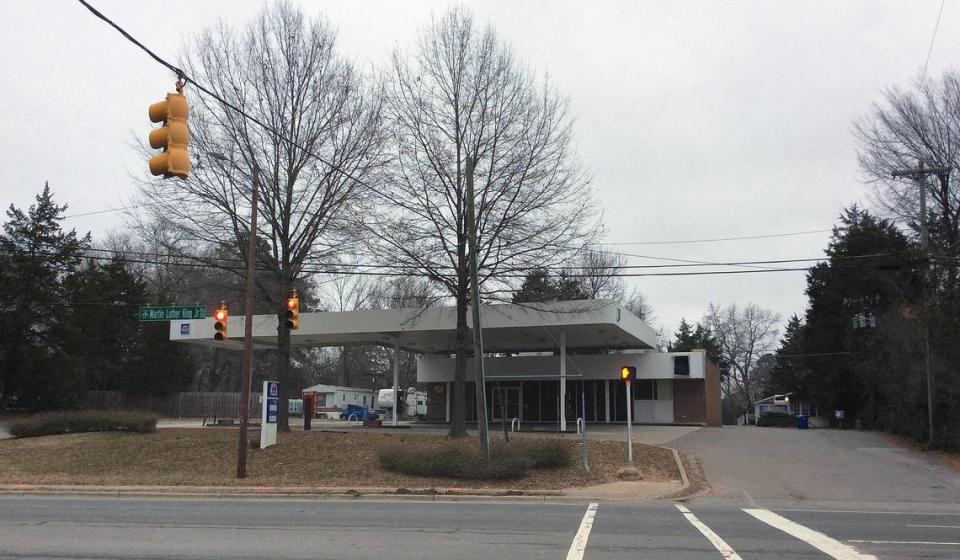Chapel Hill council splits over ‘terrible’ choice between project, affordable homes
The vote on a “terrible” gas station and warehouse-size, self-storage project split the Town Council Wednesday night over whether to reject the plan or accept it to protect mobile-home residents on Martin Luther King Jr. Boulevard.
The council’s 5-3 vote fell one vote short of the two-thirds majority required to approve the permit for the 1200 Martin Luther King Jr. Blvd. project. It will return for a second vote March 10, when it will only need a majority vote.
The public hearing was closed in January after multiple meetings over the last two years.
Council member Tai Huyhn was among those who voted for the project Wednesday so that families living on the property, many of whom do not have legal immigration status and face language and economic barriers, won’t have to move.
“It is reckless to think we will have the resources and the availability of land or anything to help these 73 families relocate to anywhere in our town,” he said. “That’s just unrealistic and irresponsible.”
“These are homeowners. They own their homes; they’ve invested so much into them,” he said. “They built decks and they have gardens, and their children play in the yard just like any other neighborhood in this town. You can’t ask these people to just pick that up and move it across town or to the county. That’s just not how that works.”
Eviction possible if plan fails
Stackhouse Properties bought the 13.9-acre Tar Heel Mobile Court in 2019 and submitted a plan last year that would move some of the mobile homes around for a four-story self-storage building bigger than the Lowes store on U.S. 15-501. The existing gas station facing the street would be demolished and replaced with a new gas station and convenience store.
The commercial projects will ensure a profit so the developer can keep the mobile home park open, project officials have said. They have told the council and residents that families could be evicted and apartments built on the site instead if the project is denied.
Stackhouse is offering the town a covenant that would limit rent increases and maintain up to 83 mobile home lots offering 12-month leases. Most Tar Heel families own their mobile homes and pay $450 to $500 a month to lease the lot.
The site would remain a mobile home park for at least 15 years.
She’s had a lot of sleepless nights, council member Jessica Anderson said before voting no, but she can’t support a “terrible” project that doesn’t meet town land use, affordable housing or environmental goals just to keep residents in their homes.
The town instead can “pick up the mess that’s been made through this process where our residents have been used as pawns in a land-use game,” she said.
“The narrative being spread by the applicant that the town is responsible for the displacement of these residents is both unwise or outrageous,” Anderson said. “I refuse to be manipulated or threatened into a land-use decision, not only because this current proposal doesn’t even protect residents but it sets a terrible precedent for future applications.”
‘Smoke and mirrors’ strategy
Council members Amy Ryan and Hongbin Gu also opposed the project.
The developer will be the only winner if it is approved, Ryan said. Gu said the “smoke and mirrors” strategy for getting the storage building approved for the town’s busy transit corridor made her “furious.”
The developer still could challenge the rent control agreement with the town, which would be illegal under state law, Gu said.
“In the short term, we need to make sure this developer, who has been using tricks throughout this process, is not going to be able to drive out the residents. We need to make sure that we have resources ready to help the residents,” Gu said. “And we need to commit our resources and to actually have a long-term strategy for a mobile home strategic plan.”
Tar Heel is one of the last mobile home parks in Chapel Hill, most of which are on or near the northern section of the MLK Boulevard corridor and face development pressure. Stackhouse officials have agreed to let the town and qualified buyers and tenants in other mobile home parks know about vacancies.
The developer also agreed to create a new, signalized intersection with pedestrian safety improvements and sidewalks at Northfield Drive, and to pay $15,000 toward the construction of the town’s future North-South bus-rapid transit stop.

 Yahoo Finance
Yahoo Finance 

